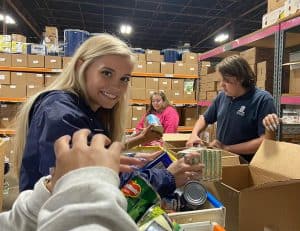Guidelines for Service Hours.
There are three basic types of service work in which students may engage.
Direct Service
Direct service involves working directly with people in need. Some examples might be doing housework for an elderly person, feeding homeless people, or babysitting for a neighbor who needs to work.
Indirect Service
Indirect service would involve giving assistance to agencies that work with those in need. Some examples of indirect service would be raising money for a pro-life agency, doing clerical work for an agency, or serving at a fund-raising banquet for a service agency. Indirect service differs from direct service in that direct service involves direct contact with those in need, whereas indirect service provides assistance to those who do serve the needy directly.
Advocacy
Advocacy would involve promotion of particular service-oriented issues. Some examples of advocacy would be lobbying the legislature on behalf of pro-life issues, distributing literature in support of homeless issues, or posting neighborhood signs supporting political candidates.
 Students may either do their service work through an existing organization, or may find work on their own. If a student chooses not to do service through an existing organization, it is advised to contact DCS’ administration ahead of time to ensure that these hours would be approved. Generally, it will be easier for students to work through an existing organization, since those agencies usually have well-defined structures and activities for filling needs. It is generally easy for such agencies to provide students with opportunities for service, either through single events or ongoing roles. In addition, existing agencies can provide some accountability to the school for the work done by the students. If students try to do work on their own, they must both design the service to be done, and must find those in need. However, some students may be uniquely situated to provide specific services for particular individuals.
Students may either do their service work through an existing organization, or may find work on their own. If a student chooses not to do service through an existing organization, it is advised to contact DCS’ administration ahead of time to ensure that these hours would be approved. Generally, it will be easier for students to work through an existing organization, since those agencies usually have well-defined structures and activities for filling needs. It is generally easy for such agencies to provide students with opportunities for service, either through single events or ongoing roles. In addition, existing agencies can provide some accountability to the school for the work done by the students. If students try to do work on their own, they must both design the service to be done, and must find those in need. However, some students may be uniquely situated to provide specific services for particular individuals.
Students may count hours done within the school setting, but not hours for which they get academic credit or a tangible benefit. For example, members of Mu Alpha Theta who provide math help classes may count those hours toward their service requirement, but students in an advanced math class who help underclass math students, and who receive some form of academic credit for that work, would not be able to count those hours. Hours of service done as part of a requirement for honors and other clubs (NHS, Beta, etc.) are also counted for this requirement.
Pay is not to be accepted by students for service work requirements, except possibly for the reimbursement of expenses or travel.
At times it may be thought, “Students should first learn to serve at their own homes, rather than going outside the family to do service.” While this sentiment may sound good, yet most service done in the context of the family should be seen as simply part of the obligations one has as part of a family, and should not be seen as a particular form of “service.” Therefore, work done within the context of the student’s immediate family is generally not to be counted toward the service requirement. For example, a student babysitting his/her younger siblings would not be counted. Some situations may be open for discussion, however. For example, students who care for elderly grandparents at home may be able to count such service, if that service is seen as “extraordinary” in some way, and not simply a part of the student’s regular household chores.
